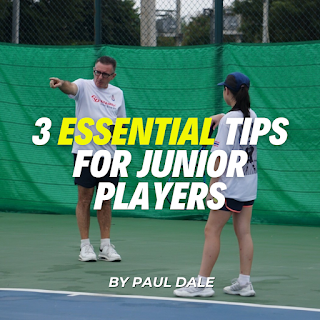If you are a junior tennis player or coaching junior players focused on the right skills, it may change. Let’s look at the three requirements that can change the difference in the junior career and prepare you for the next step in tennis.
1. The value of the bottom
Underspin is one of the most useful tennis tools, but it is often overlooked by young players and their coaches. Underspin keeps it low and controlled. Mastering Underspin gives you a significant advantage in several parts of the game:
- Zoomed shots: The art of moving forward in court and putting pressure on the opponent is missing in many junior games. However, if you cannot move forward to the net when the opportunity appears later on a professional level, your game will be strictly limited. Underspin keeps your access to a low level and forces his opponent to hit, giving you a lighter volley and It complains that they are passing on the Internet.
- Volley: With Volive, Underspin will help you create a feeling that allows you to place the ball with greater accuracy. After bouncing, the ball also keeps the ball low and complains again to hit the opponent or interfere.
- Drops: Dropshot has become another weapon in today’s tennis, and Underspin keeps the first two reflections together, which should be a goal when you use Dropshot.
- Defensive game: I see a lot of juniors who hit the ball really well from the base line, but only Topspin can hit only because of the limited capacity of grips. If you are under pressure and forced wide open in the rally topspin, it is often not possible. You need another way to respond to low or late contact, you are forced to hit the defense. Underspin can also be used to slow the speed of the meeting if necessary.
- Low balls: On short and low balls, it allows you to switch to the Underspin grip better.
Adding Underspin to the game will give you a variety and control, which makes your opponent difficult to find weaknesses in your game.
2. Movement: The most underestimated weapon in tennis
The best tennis players are not just good attackers on the ball – they are exceptional movers. Great movement allows you to reach the ball over time, purely hit and stay balanced. Poor movement puts you on all three of these elements.
Therefore, movement is so important:
- Timing and balance: Good movement puts you in perfect position to hit the ball and ensure clean contact, optimal timing and accuracy.
- Creating time: Quick and efficient work with your feet gives you additional seconds that you need to decide and make your best options for choosing your image.
- Intimidating opponents: When you move well, you can neutralize the best shots of your opponent, which makes them feel as if they couldn’t get you under pressure. They can decide to increase the speed of their shots or go to smaller margins. In any case, you get into the head and panic.
Think of movement as you think of your moves. Your moves and your movement as equally important. Movement is the basis of every blow you play. Spend more time working on it!
3. Mental Resistance: Competitive advantage
I left the most important to endure.
Tennis is a mentally demanding sport. With your unique scoring system, you can lose more points than your opponent and still win the match. Therefore, mental resistance is necessary for competing juniors.
Every player who cannot
to overcome adversity during a
The match will never be successful
This is how mental hardness helps:
- Recovery from mistakes: Everyone makes mistakes in tennis. The key is to move around quickly and focus on the next point. Easier to say than done, but completely necessary.
- Stay positive: Positive thinking keeps you calm and, most importantly, creatively, if you are a break, you need to find a way to get back to the match. Finding solutions requires you to stay positive in difficult situations.
- Treatment with pressure: Mental resistance ensures that you do not fall apart under the stress of tight matches or big points. Having a durable mindset will not allow difficult moments to take over your decision -making or stroke too much.
Building mental hardness requires time, but it is one of the most valuable skills you can develop. Durable players are those who are still fighting, regardless of the score, and find ways to win when it depends.
The conclusion
Improvement as a junior tennis player means focusing on the requirements that distinguish you:
- Learn to use the bottom control the ball and get an advantage in different situations.
- To develop your own to move To improve the strike of the ball and can even intimidate your opponents.
- Build mental resistance Stay centered, positive and determined, even if the match becomes hard.
By managing these three areas, you will become not only a better player, but also after moving from juniors.







.png)

.jpg)
.jpg)






